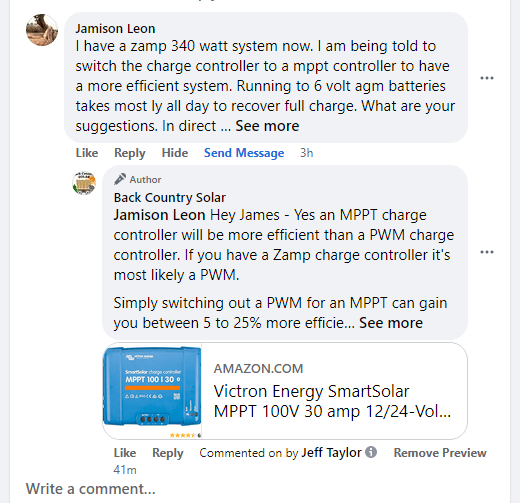Is MPPT More Efficient?
We received a question on Facebook regarding MPPT vs PWM charge controller efficiency.
We plan to write more about the topic of efficiency in a solar system and when we do we’ll shoot out an email, so if you’re not an email subscriber you can do it below.
But for now, you can read our comment below. MPPT controllers are more efficient, but there are other factors to consider as well.
Connect With Us




Sign up for the best off-grid solar info!
Qriginal Question About MPPT Efficiency
Original Question:
I have a zamp 340 watt system now. I am being told to switch the charge controller to a mppt controller to have a more efficient system. Running to 6 volt agm batteries takes most ly all day to recover full charge. What are your suggestions. In direct sunlight 8 hrs on my off grid property.
You can view the posts here – https://www.facebook.com/backcountrysolar/posts/2060013594221084. The comment was left on March 9th, 2022 but the original post was made in 2018. We still try to get to any question that comes our way.
Our Response Regarding MPPT vs PWM
Back Country Solar to Jamison Leon
Hey James – Yes an MPPT charge controller will be more efficient than a PWM charge controller. If you have a Zamp charge controller it’s most likely a PWM.
Simply switching out a PWM for an MPPT can gain you between 5 to 25% more efficiency in your system.
BUT, it’s not just the charge controller that makes the difference. Your wire size and length, wire connections, and age and health of the batteries make a difference too.
Any loose connections are a hazard and can cut down on efficiency. Long wire lengths with improperly sized wire can cut efficiency too – especially the wires from the charge controller to the battery. We recommend having the charge controller as close to the battery as possible. Older batteries or batteries that frequently get drawn down to below 50% or 12-volts will lose their ability to hold onto a charge.
If you have a Zamp system with the original wiring your wire size is good, I would check the connections. If your batteries are older, 6-years or more, your batteries might be getting too old. I would test your cells with a hydrometer – Read my Hydrometer Battery Test Guide. Or if you work those batteries pretty hard (deplete below 50% frequently), they likely need to be replaced.
But – if you think your wires, connections, and batteries are fine you can get an MPPT and see better charging.
I would suggest looking at these MTTP controllers:
My Fav – Victron – https://amzn.to/3hW2Ft8
Known to work well – https://amzn.to/37iJh7u
One of the cheaper ones with decent reviews – https://amzn.to/3CteIHwYou can just wire these in as your system sits now. Or you can wire up your solar panels in a series configuration for a bit of a boost in efficiency (likely small). Do make sure the panels are clean and free from ANY shading. Let me know if you have questions.=
Link to Comment
MPPT is More Efficent Than PWM
It’s true that an MPPT charge controller does a more efficient job at collecting much of the available power from solar panels and charging a battery. They still experience a loss due to heat and other factors but are generally between 93 and 97% efficient. Most of the time you’ll see about 20 to 25% increase in efficiency using an MPPT over PWM.
Likewise, using a PWM charge controller and your system is losing ~30% of the available power right away. So you’ll only see 70-watts from a 100-watt solar panel. The main loss is in the voltage spread followed by the ‘pulsing’ of the controller and heat (to keep it simplified).
What do we mean by voltage spread?
The charging voltage for a battery is between 13 and 15VDC. Modern 12-volt solar panel voltage is generally around 20 to 22VDC. The spread between 15VDC for the battery and 20VDC for the solar panel is never used for charging in a PWM. But an MPPT can use this excess voltage most of the time making it more efficient.
When to Consider a PWM Charge Controller
This doesn’t mean that a PWM charge controller is useless or that an MPPT charge controller is preferred in every application. PWM charge controllers are very acceptable for smaller solar arrays or if the battery charging is minimal.
Small Solar Array – If your solar array is small, say under 200 to 300 watts, the difference between PWM and MPPT will be less than a larger array. It might make sense to get a PWM.
Likewise, for Minimal Battery Charging – If the size of your battery bank is large, AND you don’t have much consumption – PWM or MPPT won’t make much of a difference. Batteries that stay near full won’t take a full charge so there is no need to worry about maximizing efficiency. MPPT efficiency comes into play if you can utilize your full solar array power for charging.
When to Consider an MPPT Charge Controller
If you have a solar array that is 300-watts or larger and you have a battery bank that sees frequent moderate discharges you should consider an MPPT charge controller.
MPPT charge controllers efficiency comes into play when it can use the full potential of the solar panel array. If your battery stays near full it won’t have a need to use the full power from the solar system as your batteries can’t accept the full charging power.
MPPT For Higher Voltages
An MPPT charge controller can be utilized for higher voltage solar panels (residential) or 12-volt solar panels wired in a series connection to produce a higher voltage. The MPPT controller will work best when it can recoup the excess voltage. It also benefits your wiring cost as higher voltages can allow you to use smaller gauge wires for the same system.
MPPT VS PWM Cost
The final consideration is cost. A GOOD MPPT charge controller is going to be much more expensive than a PWM charge controller of the same quality.
There has been an explosion of MPPT charge controllers in recent years. Some of these new manufacturers are marking charge controllers as MPPT when they aren’t, while others have bad quality.
In some solar systems that are smaller, it might be more cost-effective to get another solar panel rather than invest in an MPPT controller. You can get a full 100-watt panel for less than a 30-amp MPPT in some instances.
More to Come on MPPT Charge Controllers
We hope to add more topics to MPPT charge controllers. If you have any questions or have a good idea for MPPT charge controller topics please reach out – info@backcountrysolar.com
